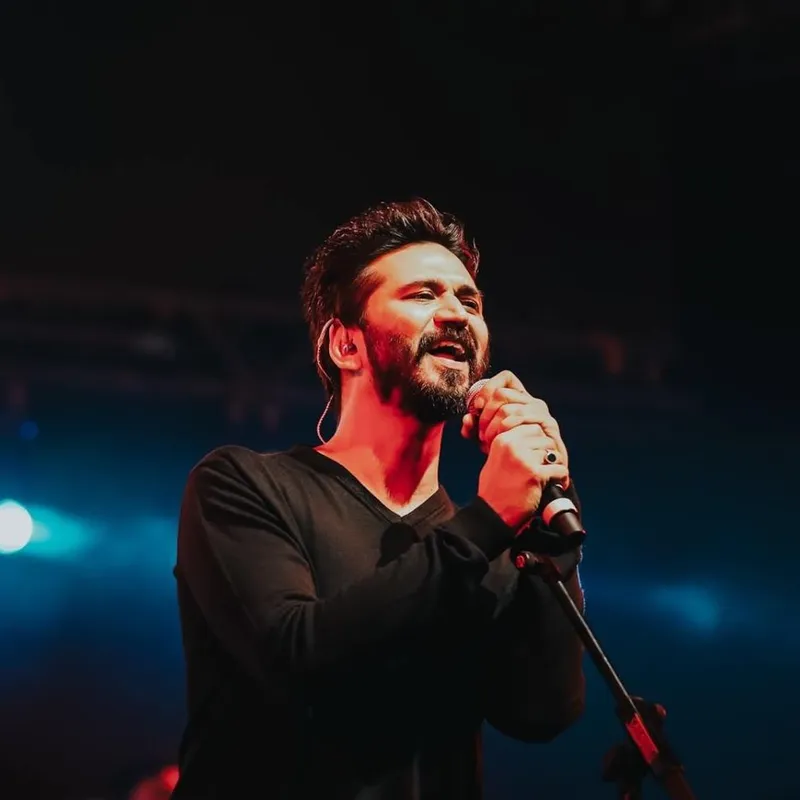The art of music: Amit Trivedi on balancing creativity with business
National Award winning music artist and composer Amit Trivedi contrasts his approach to collaborating with directors, with his independent projects.
Four years ago, a friend introduced me to the song Madhubala by Amit Trivedi. The Indian music director and singer had always made it to my playlist, with songs from films like Udaan, Queen, Udta Punjab, Fitoor, Dear Zindagi and Lootera being played on loop. But with Madhubala, I developed a strange connection. It almost felt personal, and I found myself playing the song in the background as I worked, stuck in a nature-induced house arrest as a result of the pandemic.
That’s the thing with some of these artists—they make it sound like you’re the most important person in the room to them, even when they are not physically present there.
When I set up a virtual meeting with Amit for this interview, I was prepared to either be star-stuck or intimidated. None of that happened.
On a usual Monday afternoon, Amit showed up in casuals—a blue t-shirt, his hair pushed back with a grey bandana, and the only other accessories were green and pink crystal bracelets—the former for good fortune and abundance, the latter for love.
I immediately felt at ease.
To get the ball rolling, I asked Amit how he would describe himself.
“You’ve stumped me!” came his instant reply.
After a pause Amit continued, “I am a very passionate artist…I’ve completely immersed myself, my life, into it (music). So if anything wrong happens with music, or with work, my health goes down. That’s the effect it has on me.”

Earlier this year, the playback singer and composer announced his latest album—Azaad Collab—that features 22 music artists across 13 tracks. Amit has collaborated with the likes of Sunidhi Chauhan, Armaan Malik, Jubin Nautiyal, and Neeti Mohan, among others, to celebrate the diverse voices in the Indian music industry. “It is a freedom of expression, of creating something that I resonate with, and like putting it out there without anybody telling me what to make and how to make it,” he reflects.
Amit debuted as a film music composer with Aamir in 2008. But it was only a year later that he got recognised in the Hindi film industry. His contemporary, Shilpa Rao, introduced him to Anurag Kashyap, and later, Amit went on to create one of the most notable music albums of modern Hindi cinema today, for Kashyap’s Dev D. He also won the National Film Award under the Best Music Director category for the film.
But he does not make a fuss about it. “It was a very simple, organic and basic process…Nothing special as such. He (Anurag) really enjoyed what I played and he used those tracks in the film.”
Startingly, Amit doesn’t like many of his compositions that have otherwise been tagged as ‘hits’, including his notable songs like Emosanal Atyachar (from Dev D), Gal Mitthi Mitthi Bol (from Aisha), Gulaabo (from Shaandaar), and Udta Punjab (from Udta Punjab).
“It’s very strange. I always thought who would listen to these? But then their (film directors’) vision was much more powerful than mine is, and it resonated with a much wider audience…It was a job I was told to do.”
On the other hand, tracks that Amit has strongly felt beautiful about—Paayaliya (from Dev D), Manmarziyan (from Lootera), Kinare and Harjaiyaan (from Queen)—have gone on to be ‘underrated’, he says.
Do these differing expectations result in heartbreaks, we ask.
“It does. You put your heart and soul into it and you’ve really enjoyed something and when it’s not resonating with the larger audience, for whatever reason, you ask yourself why do you love it so much…But then that’s how the game is,” Amit says.
Much before Amit was awarded the National Film Award and signed for over 65 films as a music composer, his first paid gig was for a Navaratri festival in Mulund, where he played the keyboard for ten days, for Rs 15,000.
But his passion for music began right from his childhood. “The curiosity to learn and understand every detail about creating music has always fascinated me since childhood. I just kept doing that without knowing or understanding the repercussions or outcome—where will it take me, or lead me to. I was just so much in love with it, and once you’re in love, you’re just lost in that world,” says Amit.

He started his professional career as a theatre and jingle composer, creating music for brands, including McDonald’s and Airtel. He also composed tracks for Indian Idol winners Abhijeet Sawant and Prashant Tamang.
“Things happened, they kind of started falling into place on their own without me putting in too much effort. And that’s the best thing when you’re not putting unnecessary effort as much…or struggling. I hate the word struggle. There is nothing called struggle, you just flow and you need to love what you’re doing, and be very passionate and dedicated to it…Things just flow and fall into place, that’s what happened to me,” Amit says.
While music seems to come very naturally to him, so do the challenges associated with it.
Deadlines in particular are spoilsports for creativity. “I have tough times dealing with them,” Amit says.
“Creativity is very fluid, it’s not stuck to a particular time limit…But as far as films are concerned, they have release dates set way in advance. We have to work according to those dates…Whether it’s background score, song delivery, production and so many things, it gets very overwhelming at times. There are a number of times that it (deadlines) has made me anxious…I have got anxiety and fallen sick.”
This is where independent music comes in.
Music-composing is art, at the end of the day, Amit says. “Whether it has business potential or not, you cannot stop being artistic or subdue it…You have to express.” Having said that, to also keep creating tracks that are ‘commercial’ and resonate with the masses, it is important to keep finding the balance.
“This is a cut-throat industry. There’s fame, pleasure, money, adulation, accolades and love from people on one side…Then the other side of the coin is hustling, a lot of hard work, a lot of dejections, rejections, disappointments and low points,” he says. “But I still approach it positively. I wake up every morning, leaving behind all this, and start working.”
Edited by Jyoti Narayan







